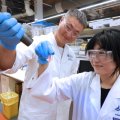Researchers in the School of Biomedical Sciences at The University of Queensland (UQ) have made a ground-breaking discovery in the study of growth hormone.
This breakthrough will create a substantial global-paradigm-shift within this scientific discipline.
This unique innovative method will be used in a number of projects to show the critical involvement of growth hormone in the development of obesity; the impact of stress on the secretion of growth hormone; the impact of growth hormone on ageing; and the role of growth hormone in disease progression in, for example, Motor Neuron Disease.
These studies are currently underway within the School.
The team was led by Professor Chen, the Professor and Chair of Endocrinology at UQ, and included Postdoctoral Research Fellow, Dr Frederik Steyn, and PhD student, Dr Lili Huang. Dr Huang receives financial support from the China Scholarship Council.
Professor Chen said this breakthrough will expand their research capabilities.
“With my experience working on the regulation of growth hormone for more than 20 years, this breakthrough makes it possible to accurately investigate detailed patterns of growth hormone levels in circulation, in commonly used genetic-disease models,” Professor Chen said.
“This will enable further breakthroughs in the coming years in the pathology and treatment of metabolic disorders, such as obesity; diabetes; anorexia; alongside significant others.”
Lead researcher, Dr Frederik Steyn, went on to describe the research.
“When we set out to develop the method it seemed like an unrealistic goal. So many experts had tried and failed,
“In the end we knew we had to give it a go, without a suitable method to properly measure growth hormone we were simply not able to answer the bigger questions.”
Dr Steyn emphasized that the accepted inability to measure growth hormone in mice, which is the most significant test group used in human-disease models in laboratory research, means that observations from critical-transgenic models are severely limited.
“Rather than focusing on improved methods for sample collection, we set out to develop a method to improve the sensitivity of detection of growth hormone in blood,”
Dr Steyn said.
By integrating this procedure with a relatively simple and less invasive blood-collection method, the team was able to collect and show the first accurate measures of growth-hormone secretion in stress-free mice.
Significantly, the paper outlining this work and methodology was rapidly accepted for publication in the global-expert journal, Endocrinology.
Dr Steyn said that other international opportunities have quickly arisen.
“We have received requests from international researchers to share the method, even though the manuscript has not yet been released,” Dr Steyn said.
“As a consequence we have established a number of collaborations not only within Australia but also in the United States; France; New Zealand and Japan.”
Media: UQ School of Biomedical Sciences, Avril Johnston-Craig, 07 3365 1536, 0408 160 784, a.johnstoncraig@uq.edu.au
Background:
PROFESSOR CHEN CHEN Professor Chen Chen was appointed Professor and Chair of Endocrinology from 2008 at the University of Queensland after serving as Head of Endocrine Cell Biology at the Prince Henry’s Institute of Medical Research, Melbourne, 1999-2007. He is a Principal Research Fellow of the Australian NHMRC. He has published more than 120 papers in international-scientific journals, including PNAS USA; Circ Res; Endocrinology; J Physiol; and Am J Physiol.
DR FREDERIK STEYN
Dr Frederik Steyn is an Early Career Researcher working with Professor Chen Chen. He received his Doctorate in 2007 at the University of Otago, in New Zealand.
DR LILI HUANG
Dr Lili Huang is a recent graduate from the Xi’an Jiaotong University Medical School (MBBS), China. Dr Huang receives financial support from the China Scholarship Council.
.jpg)









